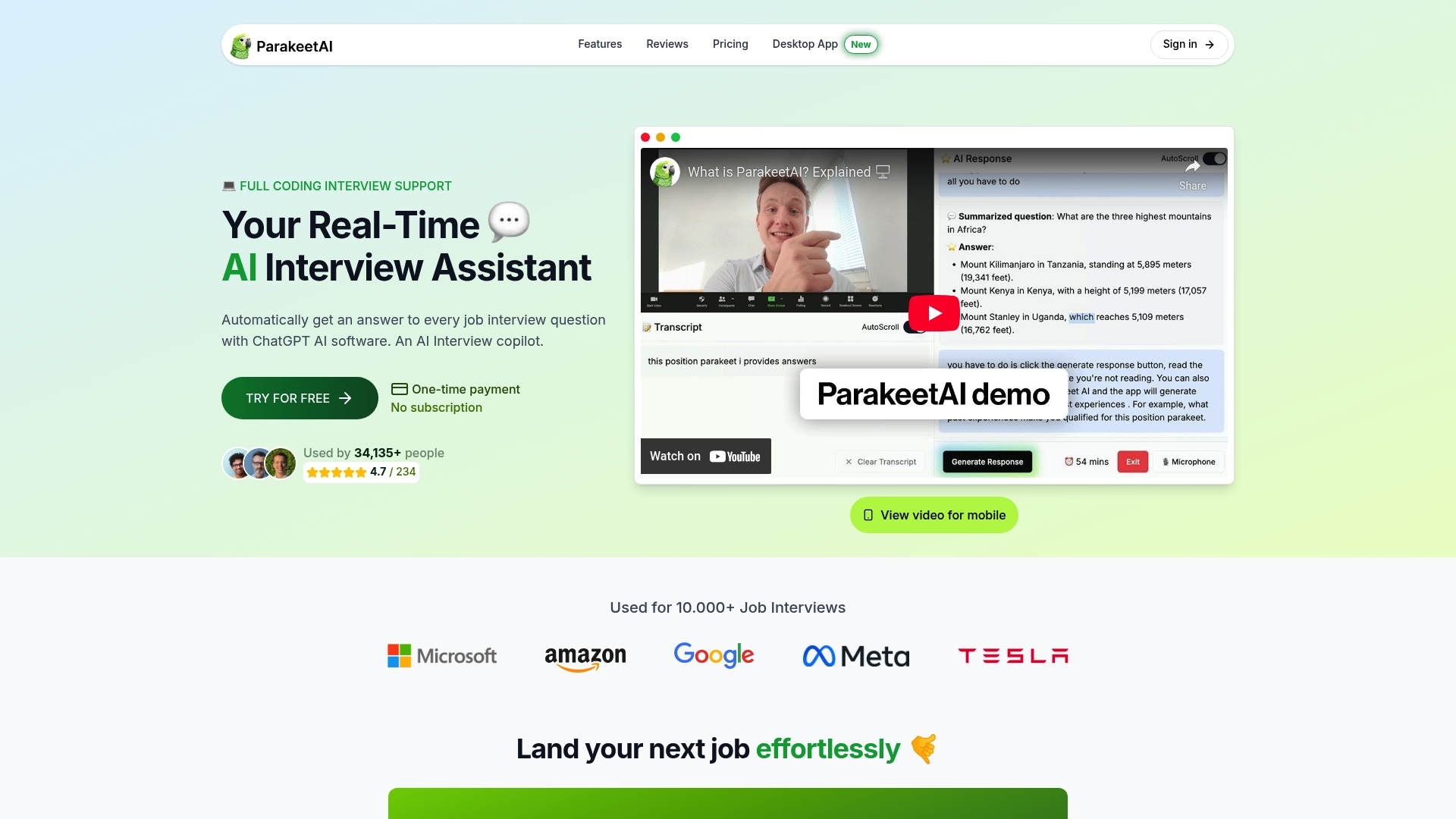Why AI Is Critical For Interviews: Complete Guide

A growing number of companies now rely on AI interview assistants, with adoption rates in HR tech surging past 35 percent last year. This shift is not just about speed. Modern AI tools offer new levels of fairness, transparency, and efficiency in hiring. From reducing bias to empowering candidates and improving decision quality, these advances reshape how organizations and job seekers connect.
Table of Contents
- What Makes AI Interview Assistants Essential
- How AI Enhances Interview Speed And Efficiency
- How AI Reduces Bias And Boosts Fairness
- How AI Supports Candidate Preparation And Performance
- Legal, Ethical, And Privacy Responsibilities
- Risks And Limitations Of AI Interview Assistants
Key Takeaways
| Point | Details |
|---|---|
| Efficiency Improvement | AI interview assistants significantly enhance recruitment efficiency by automating screening and assessment processes. |
| Bias Reduction | Implementing AI tools helps minimize human biases in hiring, promoting more objective evaluations. |
| Enhanced Candidate Preparation | AI provides personalized support for candidates, including targeted practice and real-time feedback, to improve interview performance. |
| Privacy and Ethical Considerations | Robust oversight and transparent practices are essential to address privacy risks associated with AI in the recruitment process. |
What Makes AI Interview Assistants Essential
AI interview assistants are transforming recruitment by dramatically improving hiring efficiency and precision. Why use AI job interview assistant reveals how these intelligent tools streamline the complex task of candidate evaluation.
According to research from Springer, AI in recruitment delivers significant operational efficiency by automating routine tasks and empowering HR professionals to concentrate on strategic work. The systematic review highlights that AI enables more effective and optimized hiring methods, reducing administrative burdens and enhancing decision-making processes.
The core advantages of AI interview assistants include:
- Faster candidate screening
- More objective evaluation processes
- Data-driven candidate insights
- Reduced time-to-hire
- Elimination of unconscious human bias
Research from the Journal of Innovative Employment Relations indicates that AI integration revolutionizes hiring by increasing efficiency across multiple stages. By leveraging advanced algorithms, these assistants can analyze candidate responses, communication patterns, and skills with unprecedented accuracy, providing hiring managers with comprehensive and nuanced candidate assessments that go far beyond traditional interview techniques.
How AI Enhances Interview Speed And Efficiency
AI is revolutionizing the recruitment process by dramatically accelerating interview workflows and improving overall hiring efficiency. Understanding the Role of AI Assistants in Interviews highlights how technology is transforming traditional hiring approaches.
According to research from Business Insider, AI recruiters demonstrate remarkable performance advantages. In a large-scale experiment, AI-powered hiring tools increased job offer probabilities by 12%, startup rates by 18%, and 30-day employment retention by 17%. Impressively, 78% of applicants actually preferred AI interview processes, indicating a significant shift in candidate expectations.
Key speed and efficiency enhancements include:
- Instant candidate screening
- Automated skills assessment
- 24/7 interview availability
- Rapid candidate ranking
- Elimination of scheduling complexities
Research from Springer confirms that AI-advanced selection tools make hiring substantially more efficient by quickly shortlisting candidates and utilizing AI-powered video interviews. These technological innovations dramatically reduce selection process time, minimize candidate travel expenses, and significantly decrease recruiter workload. By automating routine screening tasks, AI empowers recruitment teams to focus on strategic candidate evaluation and complex decision-making processes.
How AI Reduces Bias And Boosts Fairness
Artificial intelligence is emerging as a powerful tool for creating more equitable hiring processes by systematically addressing human-driven biases. Understanding AI in Hiring Process Explained reveals how technology can promote fairness in recruitment.
According to research from arXiv, AI systems can dramatically reduce sentiment-driven biases by an impressive 41.2%. This breakthrough demonstrates AI’s potential to minimize interviewer bias, social desirability effects, and confirmation bias that traditionally plague human-led recruitment processes.
Key fairness enhancements of AI include:
- Objective candidate evaluation
- Standardized scoring mechanisms
- Consistent interview criteria
- Removal of demographic prejudices
- Data-driven decision making
Research from the Journal of Innovative Employment Relations highlights critical strategies for maintaining algorithmic fairness. These include using diverse training datasets, implementing explainable AI models, conducting regular system audits, and maintaining human oversight. By proactively addressing potential bias sources—such as historical data patterns and model design—AI can create more inclusive and equitable hiring environments that give every candidate a fair chance to showcase their true potential.
How AI Supports Candidate Preparation And Performance
AI is revolutionizing candidate preparation by providing personalized, intelligent support throughout the interview process. Understanding the Role of AI Assistants in Interviews reveals how technology can transform interview readiness.
Candidates now benefit from sophisticated AI tools that offer comprehensive preparation strategies. These intelligent systems analyze individual strengths and weaknesses, creating targeted practice environments that simulate real-world interview scenarios with unprecedented accuracy.
Key AI-powered preparation features include:
- Personalized mock interview experiences
- Real-time feedback on communication skills
- Customized question generation
- Comprehensive performance analysis
- Confidence-building practice sessions
The emergence of AI interview assistants represents a significant leap in candidate support. These tools go beyond traditional preparation methods by providing adaptive learning experiences that continuously refine interview techniques. By offering instant, objective insights into verbal and non-verbal communication, AI helps candidates identify improvement areas, build confidence, and develop the nuanced skills needed to excel in competitive job markets.

Legal, Ethical, And Privacy Responsibilities
Artificial intelligence in interviews introduces complex legal and ethical considerations that demand rigorous oversight and transparent practices. ParakeetAI Privacy Policy provides critical guidance on maintaining responsible AI implementation.
According to research from arXiv, stakeholders emphasize the critical importance of privacy-by-design principles in AI systems. This approach calls for comprehensive strategies that prioritize user empowerment, transparency, and proactive ethical oversight to mitigate potential risks of data breaches and excessive information collection.
Key ethical and privacy considerations include:
- Explicit user consent mechanisms
- Data minimization protocols
- Robust anonymization techniques
- Clear algorithmic transparency
- Regular privacy impact assessments
Research reveals a taxonomy of 12 high-level AI privacy threats, highlighting the complexity of protecting individual rights in technological systems. By embedding ethical principles directly into AI development and maintaining strict privacy safeguards, organizations can create interview technologies that respect candidate autonomy, protect sensitive information, and build trust through responsible innovation.
Risks And Limitations Of AI Interview Assistants
AI interview technologies, while powerful, come with significant inherent risks that demand careful consideration. Understanding the Role of AI Assistants in Interviews provides critical insights into navigating these technological challenges.
An Australian study warns of profound discrimination risks, revealing that AI interview tools may systematically disadvantage non-native English speakers and individuals with speech-affecting disabilities. The research highlights alarming error rates between 12-22% and significant transparency issues in algorithmic decision-making processes.
Key limitations of AI interview assistants include:
- Potential algorithmic bias
- Difficulty assessing complex soft skills
- Limited understanding of nuanced communication
- Challenges with diverse communication styles
- Inability to interpret contextual emotional intelligence
According to Google CEO Sundar Pichai, AI struggles to authentically evaluate human traits, prompting a critical reconsideration of fully automated interview processes. This underscores the importance of maintaining human oversight and using AI as a complementary tool rather than a complete replacement for human judgment. By recognizing these limitations, organizations can develop more balanced, fair, and effective candidate evaluation strategies that leverage AI’s strengths while mitigating its inherent technological constraints.
Here’s a comparative overview of AI interview assistant benefits and challenges:

| Aspect | Key Benefits | Core Limitations |
|---|---|---|
| Efficiency | Faster screening Automated assessments 24/7 availability |
Error rates Heavy reliance on algorithms |
| Fairness | Objective evaluation Standardized criteria |
Algorithmic bias Data pattern risks |
| Candidate Preparation | Personalized coaching Instant feedback |
Limited soft skill analysis Lacks context nuances |
| Privacy & Ethics | Consent protocols Transparent processes |
Privacy risks Opaque decision logic |
| Human Oversight | Reduced bias Strategic focus for HR |
Cannot fully replace human judgment |
Unlock Hiring Success With Real-Time AI Interview Support
The article “Why AI Is Critical For Interviews: Complete Guide” highlights key challenges like bias reduction, efficient screening, and enhancing candidate preparation. If you are facing the tough task of speeding up your hiring process while ensuring fairness and accuracy, AI interview assistants offer a powerful solution to these pressing problems. With capabilities such as objective evaluation and personalized feedback, they transform how interviews are conducted to help you find the best fit faster and with more confidence.
Experience these benefits firsthand with a real-time AI job interview assistant that listens and provides instant answers to every question. This innovative tool addresses interview complexities and helps both candidates and hiring teams excel. Explore how our technology aligns with insights from Understanding the Role of AI Assistants in Interviews to make your hiring smarter and faster.

Take control of your interview process today by visiting ParakeetAI. Discover how leveraging AI can reduce unconscious bias, streamline candidate screening, and enhance interview preparation now. Don’t let outdated hiring methods hold you back. Try our AI solution that truly listens and responds instantly to every interview question and make your next hire your best hire.
Frequently Asked Questions
What are the key benefits of using AI interview assistants?
AI interview assistants offer numerous advantages, including faster candidate screening, more objective evaluation processes, data-driven candidate insights, reduced time-to-hire, and the elimination of unconscious human bias.
How does AI improve the speed and efficiency of the interview process?
AI enhances interview speed and efficiency by providing instant candidate screening, automating skills assessments, enabling 24/7 interview availability, and quickly ranking candidates, thereby reducing scheduling complexities.
In what ways does AI help reduce bias in hiring?
AI helps reduce bias by offering objective candidate evaluations, employing standardized scoring mechanisms, ensuring consistent interview criteria, and removing demographic prejudices through data-driven decision-making.
What ethical and privacy considerations should be taken into account when using AI interview assistants?
When using AI interview assistants, it’s crucial to implement explicit user consent mechanisms, data minimization protocols, robust anonymization techniques, clear algorithmic transparency, and regular privacy impact assessments.




